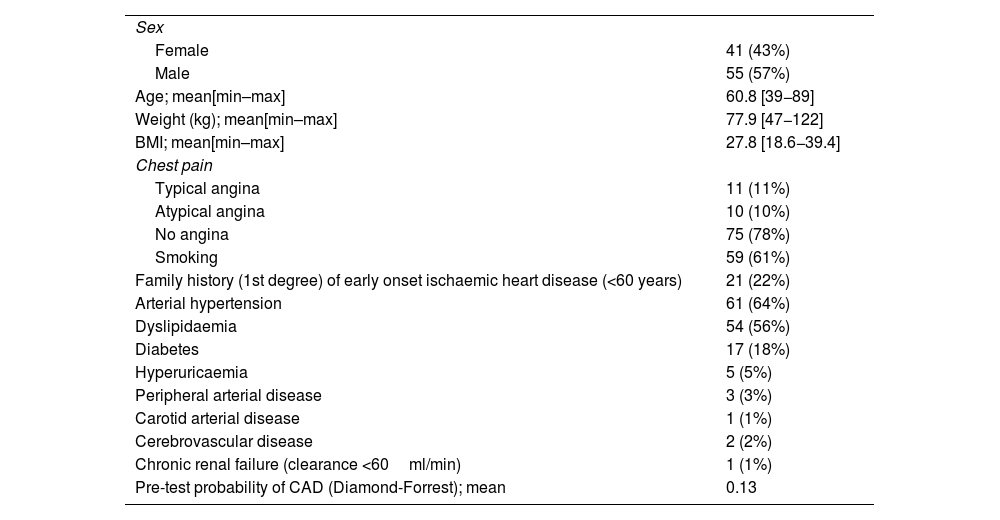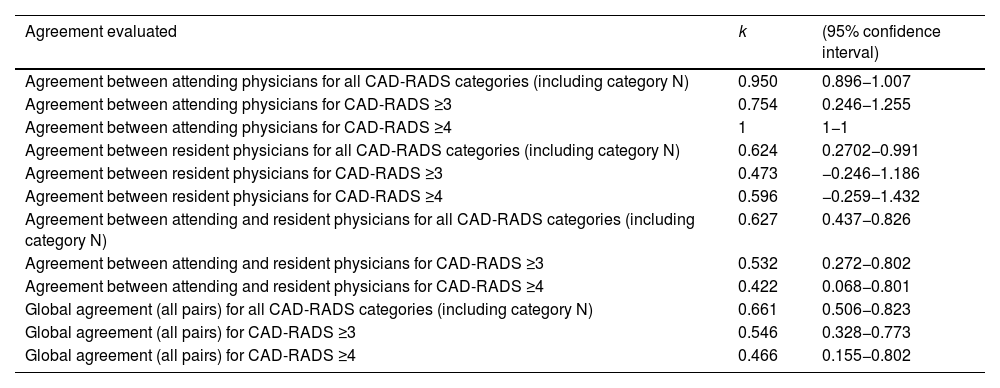Incorporating coronary computed tomography angiography (CTA) in the hospital workup for suspected acute coronary syndrome requires appropriate skills for interpreting this imaging test. Radiologists’ skills can affect the interobserver agreement in evaluating these studies.
ObjectiveTo determine the interobserver agreement according to radiologists’ experience in the interpretation of coronary CTA studies done in patients who present at the emergency department with acute chest pain and low-to-intermediate probability of acute coronary syndrome.
Materials and methodsWe studied the interobserver agreement in the urgent evaluation of coronary CTA studies in which CAD-RADS was used to register the findings. We created pairs of observers among a total of 8 assessors (4 attending radiologists and 4 radiology residents). We used the kappa coefficient to estimate the overall concordance and the concordance between subgroups according to their experience.
ResultsThe agreement was substantial between experienced radiologists and residents (k=0.627; 95%CI: 0.436–0.826) as well as between all the pairs of observers (k=0.661; 95%CI: 0.506–0.823) for all the CAD-RADS together. The degree of agreement within the group of experienced radiologists was greater than that within the group of residents in all the analyses. The agreement was excellent for the overall CAD-RADS (k=0.950; 95% CI: 0.896–1) and for CAD-RADS ≥ 4 (k=1); the agreement was lower for CAD-RADS ≥ 3 (k=0.754; 95% CI: 0.246–1.255). The agreement for the residents for these categories was k=0.623, k=0.596, and k=0.473, respectively.
ConclusionThe agreement among attending radiologists regarding the assessment of urgent coronary CTA studies is excellent. The agreement is lower when residents are paired with attending radiologists. These findings should be taken into consideration when implementing coronary CTA in emergency departments and in the organisation of radiological staff for interpreting and reporting this imaging test.
La incorporación de la angiografía coronaria por tomografía computarizada (ACTC) a la atención sanitaria en las urgencias hospitalarias hace necesario una adecuada capacitación para la interpretación de esta prueba de imagen. Esta capacitación puede afectar al grado de concordancia interobservador de los radiólogos que evalúan dichos estudios.
ObjetivoEvaluar la concordancia interobservador en función de la experiencia en la interpretación de ACTC realizadas a pacientes que acuden a urgencias por dolor torácico agudo (DTA) con probabilidad baja-intermedia de síndrome coronario agudo (SCA).
Materiales y métodoEstudio de concordancia interobservador en la evaluación de ACTC realizadas en contexto urgente utilizando CAD-RADS como registro de resultados. Se crearon parejas de observadores entre un total de 8 evaluadores (4 staff y 4 en formación). Se estimó el grado de concordancia global y entre subgrupos de acuerdo con su experiencia mediante el coeficiente kappa.
ResultadosLa concordancia fue sustancial entre radiólogos experimentados y en formación (k=0,627; IC95%: 0,436−0,826), así como para todas las parejas de evaluadores (k=0,661; IC95%: 0,506−0,823) para todas las categorías CAD-RADS en conjunto. El grado de acuerdo del grupo de radiólogos experimentados fue superior al de los radiólogos en formación en todos los análisis realizados. La concordancia fue excelente para CAD-RADS global (k=0,950; IC95%: 0,896−1) y para CAD-RADS ≥ 4 (k=1), observando un menor acuerdo para CAD-RADS ≥ 3 (k=0,754; IC95%: 0,246−1,255). Los valores del personal en formación para estas categorías fueron k=0,623, k=0,596 y k=0,473, respectivamente.
ConclusiónLa concordancia entre radiólogos staff en la evaluación de ACTC realizadas a pacientes en el contexto de urgencias es excelente. El grado de acuerdo es menor cuando el personal inexperto forma parte de las parejas analizadas. Debemos tener en consideración estos datos en la implantación de esta prueba de imagen en la urgencia hospitalaria y en la organización del personal de radiología para su interpretación e informe.
Artículo
Comprando el artículo el PDF del mismo podrá ser descargado
Precio 19,34 €
Comprar ahora












